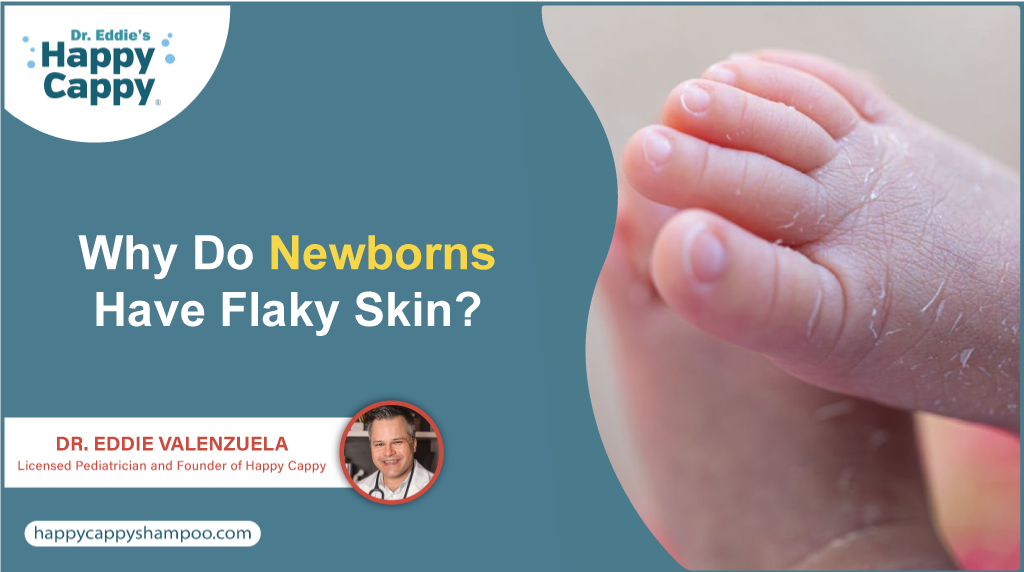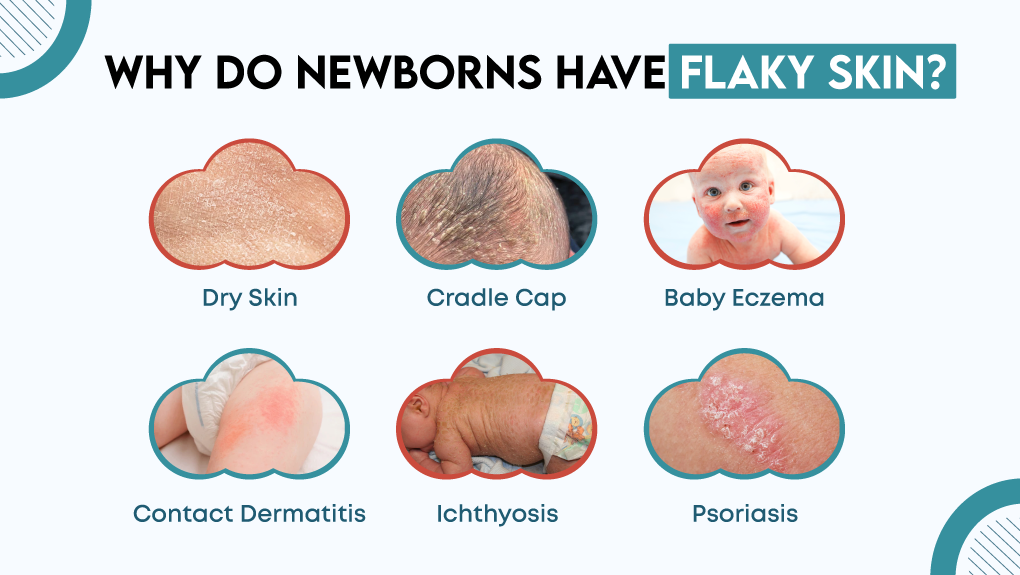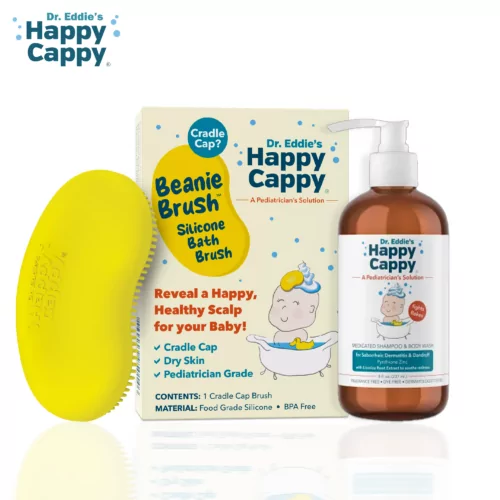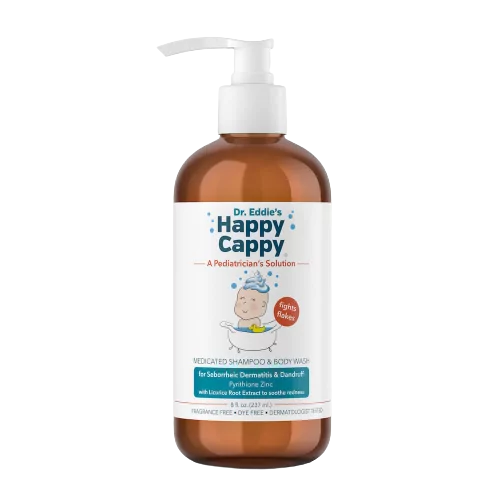
When we think of newborns, we usually imagine soft, smooth, and supple skin. But in reality, babies are more prone to developing skin conditions than adults. Their skin and its protective barrier are not fully formed yet, which makes it more vulnerable.
One of the most common issues parents experience is newborn flaky skin. Most of the time, it is a normal part of their growth; however, sometimes it can be a sign of an underlying issue that requires proper care and attention.
In this blog, you can get the answer to one of the most common questions on every parent’s mind: “Why is my newborn’s skin so dry and flaky and how to get rid of it?”
Is it Normal for Newborns to Have Flaky Skin?
Before we jump into the causes for flaky skin in babies, it is important that you understand that most of the time, flakiness is caused by newborn skin peeling, which is a normal process that almost every baby has to go through.
Inside the womb, babies have a thin layer known as vernix that covers their bodies and protects their skin. However, after birth, this protective layer comes off. It gets wiped off by the health care staff at the hospital along with other fluids.
Once the protective layer is gone the skin is allowed to slough. This phenomenon is considered normal and is more prominent in babies who are born after the due date.
Why Do Newborns Have Flaky Skin?

Now, what if it’s not newborn skin peeling? Is there something else that can cause flaky skin in babies? The answer is yes, there are many skin conditions and environmental factors that can cause dry, flaky skin in newborns, such as:
Dry Skin
Dry skin is as common in children as it is in adults. In fact, because the baby’s skin is still developing, it is more prone to experiencing dry skin. Skin dryness, in easy terms, is just when the skin lacks its essential moisture and oils that keep it soft and smooth.
It can be caused by various reasons, from extreme weather conditions, sun exposure, to not properly moisturizing the skin; little things can cause it. Sometimes, even the fragrances and harsh ingredients can also cause dry, flaking skin in babies.
Cradle Cap
Seborrheic dermatitis is a common skin and scalp condition experienced by adults; however, when babies experience it, it’s known as cradle cap. It’s because it usually affects their scalp and forehead, places where the babies wear their caps.
Cradle cap can cause flaky skin on a newborn’s scalp. It also causes thick, greasy, yellow or white flakes and scales and redness and irritation on other parts of the body, such as behind the ears, around the nose, in the skin folds, and in the diaper area.
So if your baby is having thick, sticky scales on their scalp that may have a resemblance to a honeycomb, then there are chances they are experiencing cradle cap. Even though cradle cap may look painful, in reality, babies barely even notice it, and parents can easily manage the condition with the regular use of a medicated cradle cap shampoo.
Baby Eczema
Another common skin condition that is known for causing flaky, dry skin is eczema. Eczema is a chronic inflammatory skin condition that causes red, dry, irritated skin. It is more common in babies under the age of 5 years. However, anyone can experience it.
Sometimes eczema resolves as the baby grows older, while other times it may persist as a lifelong skin issue and appear again and again in the form of eczema flare-ups. Even though the exact cause for this condition is still unknown, researchers believe that it is caused by a combination of factors, such as:
- Genetics
- Compromised skin barrier
- Environmental factors
Babies who have a family history of asthma, atopic dermatitis, hay fever, and allergies are more prone to developing it. The good news is that eczema is not contagious, and mild cases can be managed at home by keeping the baby’s skin moisturized with an eczema cream.
Contact Dermatitis
Contact dermatitis is one of the different types of eczema. It is when the skin comes in contact with a certain irritant or allergen that it can trigger red, itchy, irritated, dry skin. As we discussed earlier, babies have delicate skin, which is why they are even more prone to it.
One of the most common factors that trigger contact dermatitis in babies is the harsh chemicals, such as fragrances, parabens, sulfates, and artificial dyes, in baby skincare products.
These chemicals can cause a skin reaction on the baby’s skin, and strip away its natural oils, which leads to flaking, dryness, redness, and in severe cases, rashes. The easiest way to prevent contact dermatitis is to avoid these triggers and use products that are hypoallergenic and safe to be used on a baby’s sensitive skin, like Happy Cappy Products.
Ichthyosis
Ichthyosis is a genetic disorder; in this condition, a baby is born with an extra layer of skin on their body known as collodion membrane. This layer usually looks like a thin plastic and can also make it difficult for the baby to move.
This layer usually cracks and flakes off within the first few weeks of the baby’s life. However, babies who are born with Ichthyosis are usually kept in the neonatal intensive care unit (NICU) until their condition is stable.
Psoriasis
Psoriasis is an autoimmune skin condition that can cause thick, raised, scaly patches on the skin. Even though it is more common in young adults, babies can also experience it. The scales caused by psoriasis are often confused with flaking skin.
The worst thing about psoriasis is that it can cause itchy skin, which can be very bothersome for babies. Psoriasis occurs when the immune system mistakenly starts attacking the healthy skin cells. As a result, the skin starts producing excess skin cells. These cells clump together and take the form of flakes and scales. If your baby is experiencing intense flaking and scaling that is not improving, consult a doctor immediately. There is a remote chance it is psoriasis. Although there is no permanent cure for psoriasis, a doctor will prescribe certain medications to help soothe the skin.
How to Treat Newborn Flaky Skin?
Before you start treating your newborn’s flaky skin, it is essential that you first determine what is causing it. Once you have done that, you can easily manage the condition.
Eczema Treatment
Even though there is no permanent cure for eczema, it can still be managed by taking proper care and attention of the skin. If your baby is experiencing dry, flaky skin due to eczema, then here are a few things that you must incorporate into their skincare routine.
- Wash their skin once daily with the help of an eczema shampoo and body wash.
- Moisturize their skin at least twice daily, once in the morning and once at night before going to bed with a fragrance-free baby eczema cream.
- Don’t forget to moisturize the baby’s skin after giving them a bath.
- If the air in your house is dry, you can consider the use of a humidifier to make it moist and prevent the baby’s skin from becoming dry more often.
If the itching and irritation associated with eczema are intense, then consult a doctor; they may suggest wet wrap therapy or other prescribed medications to soothe the skin.
Cradle Cap Treatment
Cradle cap usually does not cause discomfort to the baby. However, the scales may look irritating, and most parents want to get rid of them fast. The best and easiest way to get rid of the flakes and scales is to wash your baby’s scalp and skin with the help of a shampoo for cradle cap.
Here is how to do it the right way:
- Wet your baby’s skin with lukewarm or cool water.
- Then apply a small amount of shampoo and gently massage it with your fingertips.
- Let the shampoo rest on the skin for a few minutes.
- Consider using a cradle cap brush to gently massage the baby’s scalp and remove the excess scales.
- Then thoroughly rinse off the shampoo and make sure not to leave any residue behind.
Once the flaking and scaling start to improve, you can gradually reduce the use of shampoo to 2 to 3 times a week.
Treating Dry Skin
To treat dry skin in babies, make sure to moisturize their skin with a baby moisturizer for dry skin. Use it at least twice daily to keep their skin moist. If you suspect that the baby’s skin is getting dry more often, then you can also increase the use of moisturizer.
However, always make sure to use a cream that is
- Fragrance-free
- Paraben-free
- Sulfate-free
- Dye-free
- Alcohol-free
- Hypoallergenic
- Cruelty-free
- Vegan-friendly.
If you are looking for a skin-friendly baby moisturizing cream, then try Happy Cappy Moisturizing Cream. It is specially formulated for babies’ sensitive skin. It is free from any harsh chemicals, instead containing skin-soothing and hydrating natural ingredients like licorice root extract, glycerin, and white petrolatum.
Home Remedies for Newborn Flaky Skin
Apart from keeping the skin clean and moisturized, here are a few more things that you can do to manage flaky, dry skin in newborns.
- Keep the baby’s bathtime short to a maximum of 10 minutes.
- Always use lukewarm water instead of hot water to wash the baby’s skin.
For drying their skin, always use a soft towel and instead of rubbing, pat their skin dry.
- Avoid using baby skin care products that contain harsh chemicals.
- Moisturize the baby’s skin while it’s a little damp after washing it.
- Use fragrance-free detergents to wash your baby’s clothes and bedding.
- Protect the baby from direct sunlight by covering their body with clothes, and if the baby is older than 6 months, then you can use baby sunscreen.
- Always dress your baby in soft, lightweight, loose clothes.
Managing Eczema and Cradle Cap with Happy Cappy

Dr. Eddie at Happy Cappy has developed skin-friendly products specifically designed for babies’ sensitive skin. Happy Cappy Medicated Shampoo and Body Wash is infused with 0.95% pyrithione zinc, which has been known to be effective in reducing flaking and scaling associated with seborrheic dermatitis.
It is one of the first medicated shampoos that is safe to be used by babies for cradle cap. And if your baby is experiencing Eczema, then you can try Happy Cappy Daily Shampoo to wash their skin and Happy Cappy Eczema Cream to moisturize their skin. These products contain ingredients like licorice root extract, glycerin, and provitamin B5 that help soothe the itching, redness, and irritation that can be found in those with eczema prone skin.
Conclusion
Newborn flaky skin is most of the time a natural scenario that most babies go through; this phenomenon is known as newborn skin peeling. However, sometimes a flaky skin can also be a symptom of certain skin conditions such as eczema, cradle cap, contact dermatitis, psoriasis, and ichthyosis.
If you are unsure what is causing dry, flaky skin in your newborn, then consult a doctor for an accurate diagnosis. If it’s eczema, then you can use an eczema cleanser to wash their skin daily and moisturize it with the help of an eczema moisturizer.
If they are experiencing cradle cap, then wash the baby’s skin and scalp once daily with a medicated cradle cap shampoo until the condition starts getting better.
FAQs
Is it normal for newborns to be flaky?
Yes, usually the flaking is considered normal. Babies have a thin protective layer on their bodies in the womb, which is removed after their birth. Peeling of the first layer of skin can take several weeks to complete. This flaky skin on a newborn is normal.
What can I put on my newborn’s flaky skin?
If your baby is experiencing flaky skin due to newborn skin peeling, then it is better to leave it alone, or moisturize the baby's skin with a baby face and body moisturizer.
How long do babies have flaky skin?
Usually, the newborn skin peeling resolves on its own within a few weeks. However, if the flaking is not getting better, then consult a doctor. There is a chance that the dry, flaky skin is a symptom of some other skin condition, such as eczema, psoriasis, or cradle cap.
How to moisturize newborn skin?
Take a small amount of fragrance-free baby moisturizing cream on your hand. Rub your palms together and then gently apply the cream on the baby’s skin. Make sure to always use a moisturizer that is free from any skin-irritating or harsh chemicals.
Why is my newborn's scalp flaking?
If you notice that your newborn is experiencing flaking on the scalp, then you may be dealing with cradle cap. This condition is also known as seborrheic dermatitis. It can cause thick, greasy, yellow or white flakes and scales to appear on the scalp, eyebrows, and forehead. It can also cause redness behind the ears, in the skin folds, and around the diaper area.






